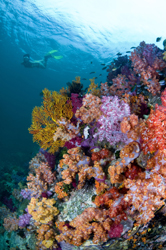Marine invertebrates — effects of ocean acidification
Calcification takes place when calcium salts accumulate in body tissue. The AMICAL project investigated the effect of rising partial pressure of carbon dioxide (pCO2) levels on model marine organisms. Tropical coral juveniles (Acropora millepora) and two species of Mediterranean pteropods (Limacina inflata and Cavolina inflexa) were used. Pteropods are a type of sea snail commonly known as sea butterflies. These organisms construct their skeletons and shells from aragonite, a form of calcium carbonate (CaCO3). Aragonite is less stable and dissolves more readily under high pCO2 levels than another form of carbonate known as calcite. The latter is the primary constituent in the shells of many types of marine organisms. Researchers investigated the chronic and acute effects of elevated levels of pCO2, as well as the effect of increased temperature combined with higher pCO2 levels on coral juveniles. The A. millepora larvae were kept under conditions that simulated different environmental scenarios for the 21st century. Molecular responses in corals were measured using high-throughput RNA sequencing. The calcification and respiration rates of pteropods were measured under low- and controlled pH conditions to determine the physiological impact of raised pCO2 levels. the molecular approach revealed that in A. millepora, elevated pCO2 levels strongly suppressed metabolism but enhanced extracellular organic matrix synthesis. Targeted analyses showed complex effects on genes implicated in calcification. In addition, scientists uncovered a number of novel candidate genes for a role in calcification, providing a basis for future studies. According to the pteropod study, the animals demonstrated a significant decrease in calcification rate under low-pH (elevated pCO2) conditions. AMICAL efforts have provided the first assessments on the physiological and molecular responses of two very sensitive marine invertebrates to rising pCO2 levels. Project outcomes will be of great interest to biologists working in the field of comparative genomics, as well as those involved in studying climate change.







